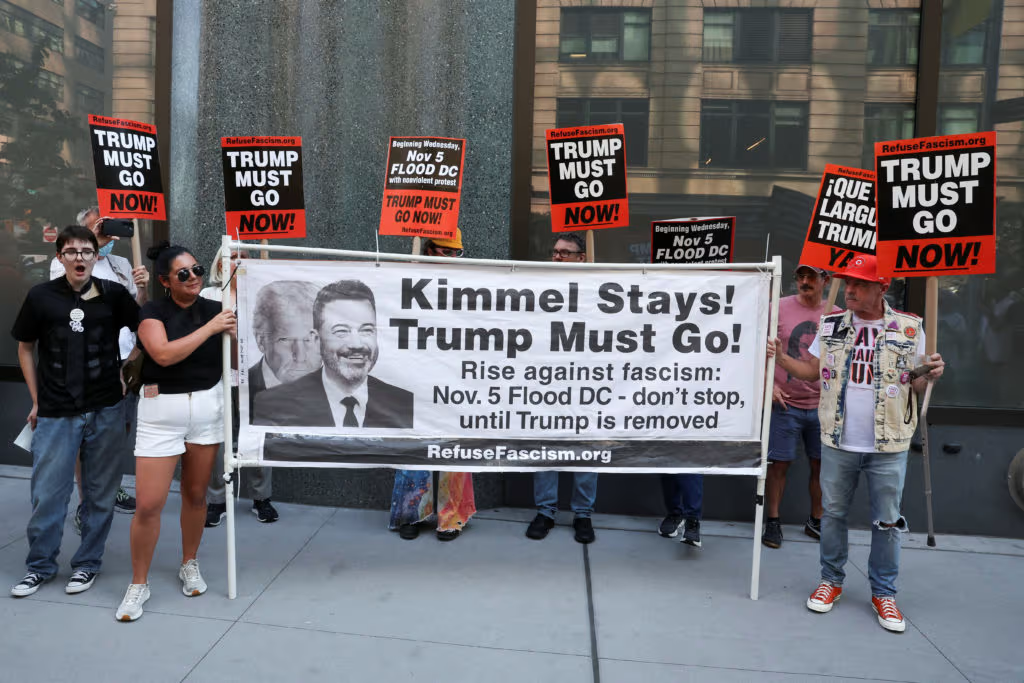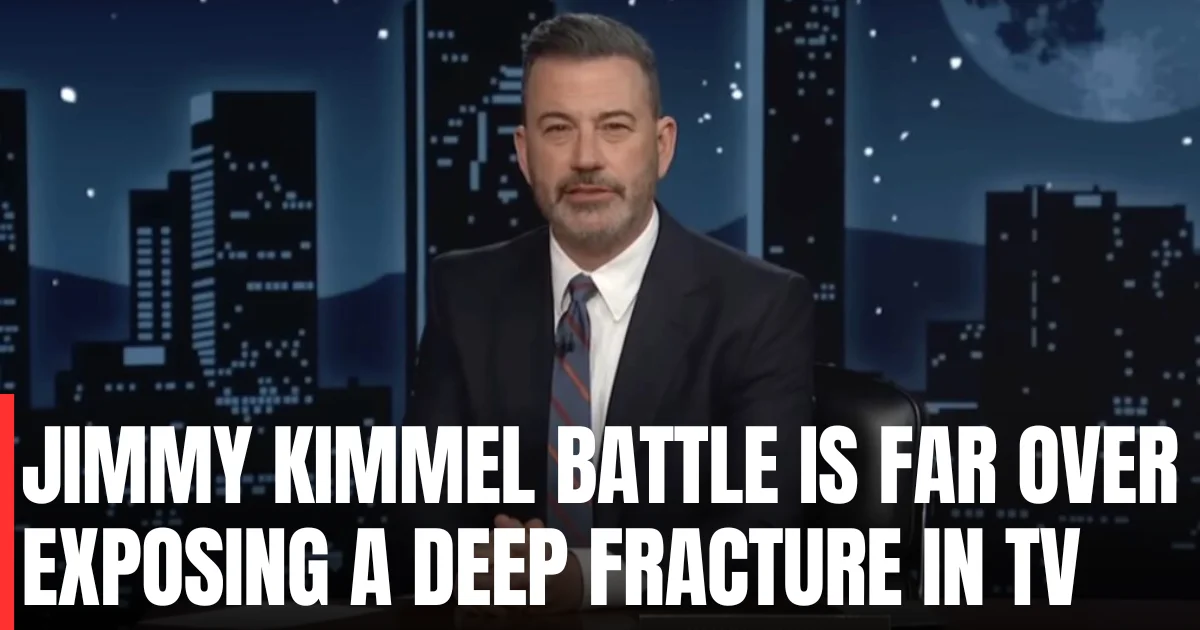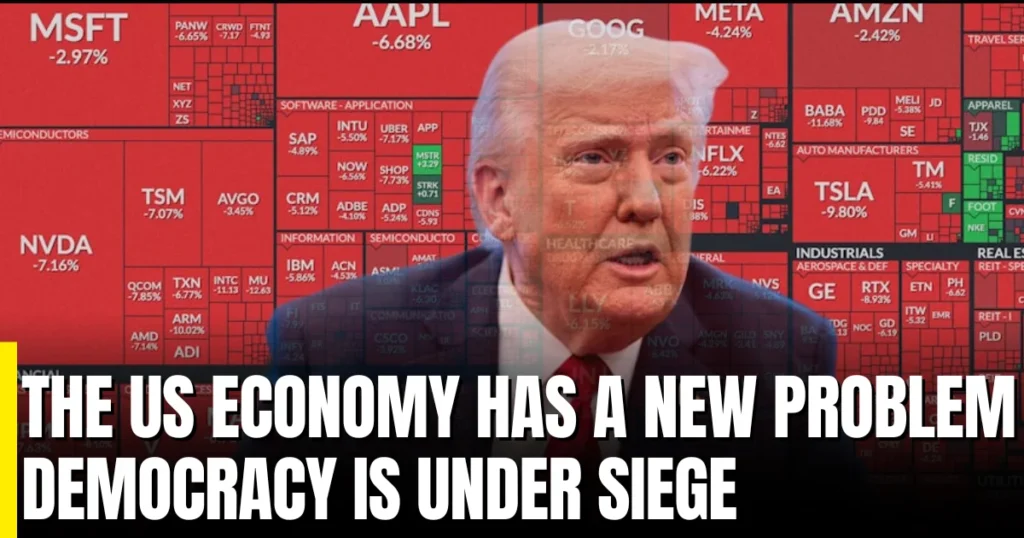Jimmy Kimmel’s ABC return sparks free speech debates, MAGA backlash, and fractures in broadcast TV. Here’s what it means for media’s future.
Table of Contents
The Jimmy Kimmel Battle Is Far from Over — And It’s Exposing a Deep Fracture in Broadcast TV

Kimmel’s Return to ABC Comes with Tensions
Jimmy Kimmel is set to return to ABC tonight, but his comeback won’t reach every household. Some station groups, including Sinclair and Nexstar, continue to block or preempt his late-night show, creating one of the most high-profile media clashes in years.
What began as a suspension tied to Kimmel’s controversial comments has now snowballed into a heated battle over free speech, political influence, and the future of broadcast television.
Free Speech or Political Pressure?
Kimmel’s suspension highlighted the growing political influence on media companies. MAGA-aligned commentators and politicians openly pressed for action against ABC’s parent company, Disney. FCC Commissioner Brendan Carr’s warning about “the easy way or the hard way” became a rallying cry for those seeking to punish Disney.
Even though ABC reinstated Kimmel, the controversy reflects what PEN America called a “vindication for free speech” — and also a reminder of how fragile that freedom can be under political pressure.
Disney, Politics, and the NFL Deal

The dispute doesn’t stop with Kimmel. Trump allies have suggested that Disney’s broader media ventures — including ESPN’s pending deal with the NFL Network — should face extra scrutiny. While such reviews are typically antitrust matters, some conservatives argue Disney should be judged on whether it “represents all Americans.”
This mixing of politics and media regulation raises alarms for free expression and sets a precedent that could affect other networks like Comcast and Warner Bros. Discovery.
Nexstar and Sinclair Dig In

Nexstar, one of the largest TV station operators in the country, announced it will continue to withhold Kimmel’s show. The company tied its decision to ensuring “respectful, constructive dialogue” in the markets it serves. Meanwhile, Sinclair has also declined to broadcast Kimmel’s return.
These moves underscore the fracturing of broadcast television, where local affiliates increasingly act on political or corporate calculations rather than simply airing network programming.
A Bigger Divide in Broadcast TV
The Kimmel controversy highlights how late-night comedy — once a unifying staple of American television — has become another front in the country’s cultural and political divide. What used to be “broad” in broadcast TV is now deeply fractured along red and blue lines.
As CNN’s Jake Tapper put it during an interview with Seth Meyers, “I don’t think it ends with Kimmel.” If this trend continues, future battles could involve Comcast, Warner Bros. Discovery, and other major players.
FAQs
Q1: Why was Jimmy Kimmel suspended from ABC?
Kimmel was temporarily sidelined after his remarks on Charlie Kirk’s assassination case sparked backlash from conservative commentators and political figures.
Q2: Why are some stations refusing to air Kimmel’s show?
Groups like Nexstar and Sinclair argue their decisions reflect audience sensitivities and a need for “constructive dialogue,” but critics see it as political censorship.
Q3: How does Disney’s NFL deal connect to the Kimmel controversy?
Trump allies have suggested the government scrutinize Disney’s NFL Network acquisition as retaliation for ABC’s handling of Kimmel, blurring lines between regulation and politics.
Q4: What does this mean for the future of broadcast TV?
The dispute reveals how polarized media has become, with local affiliates, political actors, and cultural battles reshaping what Americans can watch on traditional TV.
Conclusion
Jimmy Kimmel’s return to ABC isn’t just about one comedian — it’s about the intersection of free speech, politics, and the future of broadcast television. With Nexstar, Sinclair, and political figures continuing to pressure Disney, this battle highlights a much larger fracture in the American media landscape.
As broadcast TV becomes increasingly divided, Kimmel’s saga may be remembered as a turning point — when comedy, politics, and corporate power collided in ways that changed television forever.

